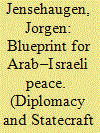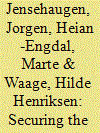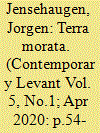|
|
|
Sort Order |
|
|
|
Items / Page
|
|
|
|
|
|
|
| Srl | Item |
| 1 |
ID:
134601


|
|
|
|
|
| Summary/Abstract |
After the 1973 Arab–Israeli war, the American Secretary of State, Henry Kissinger, conducted a series of negotiations between Israel and its Arab adversaries, culminating in three disengagement agreements. As successful as these were, by late 1975 Kissinger’s step-by-step approach had stagnated. New approaches seemed essential to push the peace process forward. Throughout 1975, a Brookings Institution study group wrote a report on how the United States could better approach Arab–Israeli peacemaking. It recommended a comprehensive approach, aimed at solving all outstanding questions, by including all the parties within the same framework. The recommendations advocated including the Soviet Union in the peace process and that the Palestinians should represent themselves. The report was highly influential on President Jimmy Carter’s subsequent approach towards the Arab–Israeli conflict—and many of the report’s authors staffed his Administration. Carter’s perceived adaptation of the report aggrieved the Israelis, whilst for others the Brookings report served as a normative benchmark for the Carter presidency.
|
|
|
|
|
|
|
|
|
|
|
|
|
|
|
|
| 2 |
ID:
114168


|
|
|
|
|
| Publication |
2012.
|
| Summary/Abstract |
Between early 1947 and May 1948, the Zionist movement went from being a non-state actor representing the minority population within the territory of the British Mandate of Palestine to establishing the State of Israel, which would be recognised almost instantaneously by the world's two Superpowers, the United States and the Soviet Union. Such a result, however, was never a given. What processes allowed a non-state actor, the Zionist movement, to secure international acceptance for the creation of a Jewish state in highly ambiguous circumstances? This analysis explores the dual-track adopted by the Zionist movement, whereby it worked to create facts on the ground within Palestine whilst securing support for its state-building project at the international level. By establishing state-like institutions in Palestine whilst building international support, the Jewish Agency was able to secure for itself a unique place from which to declare statehood.
|
|
|
|
|
|
|
|
|
|
|
|
|
|
|
|
| 3 |
ID:
172378


|
|
|
|
|
| Summary/Abstract |
When Menachem Begin, Israeli prime minister and founder of the Likud party, formulated Israel’s claim to the West Bank, he did not utilise the classic terra nullius settler argument. Instead, his ideological claim was that the land was a terra morata, a territory which had been in a state of ‘extratemporal hiatus’, to borrow a term from Bakhtin. This was illustrated through his insistence on using the Biblical names Judea and Samaria to denote the West Bank. The Zionist claim to the land was thus not that it lacked a sovereign, but rather that the sovereign had returned. The Israeli occupation was thus construed as a resumption of history, while the Palestinians were placed outside history, negating their historical and contemporary claim to the land. This article analyses how Begin’s worldview played out by investigating the self-rule proposal for the Palestinians which he launched in 1977. This proposal (if implemented) would have postponed any claims of sovereignty over the territory indefinitely, while ensuring that the Palestinians gained no national autonomy. In essence, Palestinian self-rule was a sleight of hand. For Begin the West Bank (and Gaza) were eternally Jewish territories, and the Palestinians mere residents on the land. Unlike Israeli settlers, they were not considered to be of the land.
|
|
|
|
|
|
|
|
|
|
|
|
|
|
|
|
|
|
|
|
|